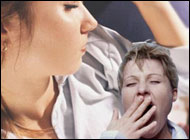Tips to Get a Good Night’s Sleep
Short on sleep? According to sleep experts, people are sleeping less than they used to and the “sleep debt” can take a toll on your health, relationships and work performance.
Despite the popular notion that you need less sleep as you get older, sleep needs generally remain constant throughout adulthood. And sleep loss can take a real toll on your health. Lack of sleep is implicated in a host of conditions and diseases from the common cold and memory impairment to high blood pressure. Lack of sleep has also been linked to increased risk of some cardiovascular diseases and some types of cancer. And, of course, if you’re short on sleep, chances are good that you’ll be irritable and have low energy.
The August issue of Mayo Clinic Health Letter offers suggestions to improve your sleep:
Make sleep a priority. Set aside adequate time for sleep and only do what tasks you can get done with the time remaining, instead of taking the reverse approach.
Go to bed and get up at about the same time every day, even on the weekends. Sticking to a schedule helps reinforce your body’s sleep-wake cycle and can help you sleep better at night.
Avoid nicotine, caffeine and alcohol. Nicotine and caffeine are stimulants that can keep you awake. Although alcohol is a depressant and may help you doze off, it can cause restless sleep.
Exercise regularly. Regular exercise, especially aerobic exercise, can help you fall asleep faster and make your sleep more restful. 
Keep active. But being too busy can keep you from getting adequate sleep. Not being busy enough can cause boredom and an inability to sleep.
Develop a relaxing bedtime routine. Do the same things each night to tell your body it’s time to wind down. Avoid doing work activities in bed, such as balancing a checkbook or using a laptop computer.
Make your bedroom cool, dark, quiet and comfortable. Adjust light, temperature, humidity and noise levels to your preferences. Pets often disrupt sleep, even if you are not aware of it. You may need to set limits on pets sharing your bedroom.
Go to bed when you are sleepy. If you don’t fall asleep within 30 minutes, get up and do something else. Go back to bed when you are tired.
Don’t put up with pain. If pain is keeping you from sleeping, talk to your doctor about drugs or therapies to reduce pain.
Use sleeping pills only as a last resort. Check with your doctor to make sure the pills won’t interact with other medications you are taking. If you take a sleep medication, reduce the dosage gradually when you want to quit. Never mix alcohol and sleeping pills.
The bottom line is the better you sleep, the better you feel.
Mayo Clinic
Revision date: June 11, 2011
Last revised: by Amalia K. Gagarina, M.S., R.D.